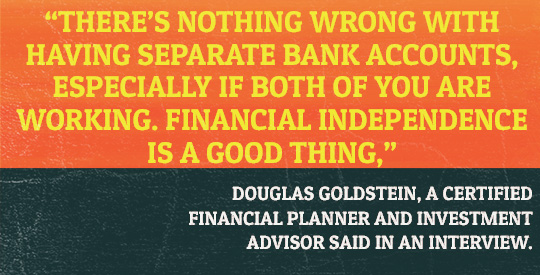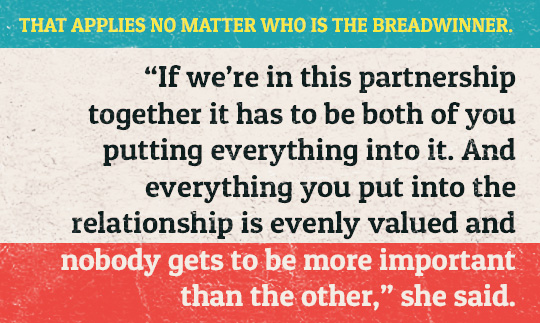If you had to guess what caused the most strife for married couples, what would you say? Sex? Spending enough time together? Growing apart? Leaving the toilet seat up? It may not surprise you to learn that it is indeed all about the Benjamins.
According to a recent national survey by Money magazine, 70 percent of married couples fight about money, topping “household chores, togetherness, sex, snoring, and what’s for dinner” as topics of argument.
Money problems can rear their ugly head in a multitude of ways. Is one of you thrifty and the other can’t resist a deal? Does one of you have debt and the other doesn’t? When is it a good time to start talking about joint accounts? Should you be thinking about a pre-nup?
These are all thorny issues that could lead to serious conflict down the line if not addressed early. Getting on the same page about your finances as a couple is critical to a harmonious relationship. Money is a minefield every couple must navigate, and we’re hoping this guide helps shed some light on this very tricky subject.
“People don’t talk about money soon enough,” Shiyan Koh, General Manager of NerdWallet.com’s Ask an Advisor said in a phone interview.
“It may seem not romantic or not the thing you talk about when you’re in love or get married, but money is the number one source of tension in relationships. We’re all raised with very different attitudes towards money and we bring those attitudes into relationships with us,” said Koh.
“It’s a super personal thing and we have to talk about it.”
Only Fools Rush In
Combining your finances with someone you love is a major step in a relationship.
Unless you’re living together, are sharing bills or have made a large joint purchase using both of your credit (like a house or car), there’s really no good reason to become attached at the hip financially. Daytime television devotes hours each day to conflicts between former partners suing each other over money one claims the other owes them. While it makes for entertaining viewing, it’s not so fun if you find yourself in court with an ex. An ugly breakup can only escalate when you add money to the equation, so keep it out unless it starts to become necessary.
“There’s nothing wrong with having separate bank accounts, especially if both of you are working. Financial independence is a good thing,” Douglas Goldstein, a certified financial planner and investment advisor said in an interview.
“At the same time, there may be reasons to keep separate finances if your partner is a compulsive spendthrift and relies on you to watch their spending or has some kind of condition rendering them totally incapable of running their finances, such as an addiction. But in most cases, people don’t fall into these extreme categories,” he said.
If you are in a long and committed relationship and think you may be ready to test the waters, one way to dip your toes in is to open a joint checking account linked to each of your personal checking accounts. That way you each maintain your financial autonomy but at the same time build trust by having an account that is legally and on paper “yours.” Use this account to transfer your respective shares of each month’s bills/rent/payment and write checks against it. That’s right, I said checks. Not having a debit card tied to this account keeps it all business and makes account activity a lot easier to track and predict. Most checking accounts have a minimum required balance to avoid monthly fees, so keep the minimum in there at all times and consider that your $0.00.
You can also use this account as a back-door way of saving for a common short-term goal like new furniture or a vacation by depositing a little extra here and there when you can. If your share of the cable bill each month comes to $63 but you both transfer over $75 when you write the check to pay the bill, the surplus remains in the account, not to be spent until a time you both agree. That one example would pad a couple’s joint account by almost $300 a year. If you both did that a few times a month it could easily add up to $1,000 a year or more just by rounding up, and you wouldn’t even notice it was missing—because it’s not missing!
Open Kimono
Open and honest communication is the cornerstone to a healthy and lasting relationship, and being upfront with your partner about your assets as well as your debts is a major part of that. Hiding these things from your partner can be as devastating to a relationship as a sexual infidelity, says Licensed Marriage and Family Therapist Trevor Crow.
“Money is very much connected to our sense of attachment or how we feel safe in the world. And our closest relationships, our partners, the ones we’re the most closely bonded with, are deeply rooted in trust. Being there for each other, loving me for my good and my bad. All those things are the beginning of a foundation of a great relationship,” she said in a phone interview.
And, she points out, that applies no matter who is the breadwinner.
“If we’re in this partnership together it has to be both of you putting everything into it. And everything you put into the relationship is evenly valued and nobody gets to be more important than the other,” she said.
“Once you’re doing that together and you both value one another and it’s our goals as a couple, us against the world– your kids and finances will be fine. But it really does take everybody being cognizant and grateful and acknowledging each other.”
Aside from eroding the foundation of an otherwise loving relationship, withholding information about your finances from your partner could have financially ruinous consequences down the line.
“A hidden debt can spiral out of control. Secret accounts may mean that the other partner’s finances are being slowly but surely drained away. And what about tax bills for an account somewhere that you’ve never heard of, or a creditor coming to claim a loan made out in your name that you never took?” Goldstein said.
Is “Pre-Nup” Really a Dirty Word?
Not necessarily. According to the U.S. Bureau of Labor Statistics, just over 59 percent of American households have two working parents. With more and more households containing two working parents and people marrying later in life, and therefore having more time to accumulate assets (or debt) before marrying, defining the terms of who is responsible for what in advance may not be such a bad idea after all.
“Signing a pre-nup isn’t a sign of mistrust. It’s simply a way to be practical,” Goldstein says.
The sad truth, however, is that sometimes relationships don’t last, as our national divorce rate clearly illustrates.
“No one can be a prophet. By signing the agreement, you hope that you will never implement it, and you won’t lose anything if you never do. And if, unfortunately, you do break up, both of you will be grateful that you did make a pre-nup. If you’re breaking up with someone, you don’t want to be left with half of his debts from a past life!”
But how do you even bring up a topic to which so many people have a natural revulsion?
“Broach the subject in a positive way: that while you will hopefully live long and happy years between you, there’s no need for years of terrible bitterness and feuding if things ever end,” he says.
Things to Consider Before Tying That Knot…
If you’re ready to spend the rest of your life with someone, you should also be prepared to spend the rest of your life with their financial situation. In a debt-fuelled nation, it’s not uncommon for partners to bring large financial liabilities into a relationship.
“You have to consider whether you want to be jointly responsible for that,” said Koh.
“You have to take stock of where you are. What is your current situation? You talk about your income, your cash flow, your expenses, and your outstanding debt obligations. Especially people graduating with a ton of student loan debt or maybe they were a little careless and have some credit card debt. Those things are hard to talk about but you can’t talk about the future if you don’t understand what your situation is in the present,” she said.
“Even if you think you may not be formally tied to the debt, you are effectively tied to it. Because any money they’re spending to pay down that debt is money they’re not able to use to contribute to other parts of your life together.”
Opposites Attract: When a Saver and a Spender Fall in Love
Sometimes people meet and fall in love whose financial goals are miles (or light years) apart. While not insurmountable, couples are more likely to be at loggerheads if major spending decisions are made in a way that feels clandestine.
“I had one couple where the husband bought a very expensive Audi without disclosing it to her,” said Crow.
“She felt insecurity because of the expense and taking that away from their planned retirement. It scared her so much, and he kept minimalizing her feelings.”
“I’m not making this a gender issue, because I see women do this as well. ‘I make the money therefore I get to make the majority of the decisions.’ And again this goes back to valuing inputs into the relationship,” she said.
Sometimes peoples’ feelings about spending and thrift can even date back to childhood.
“It’s possible if you were raised with super frugal parents maybe now that you’re an adult you like to be able to treat yourself a little. That might seem extravagant to someone whose parents never had enough money. So they feel that anxiety about having enough money to pay for things, so they don’t want to spend money on anything that may seem like a luxury or frivolous,” said Koh.
Working Together for a Common Goal: The Rest of your Lives
The ultimate goal of any marrying couple is to spend the rest of their lives together. But at whatever stage in the relationship, clearly defining your joint and individual financial goals is absolutely essential.
“If you are just starting out together, then sit down at the beginning and look at what both of you are bringing to the marriage. Both of you should make sure that you are involved in financial decision-making from the beginning,” said Goldstein.
“One partner should not have complete control over the other one’s spending. If one of you prefers to hand things like paying the bills and monitoring the bank statements over to the other, that’s ok. But you should periodically have a “money night,” where you look over the figures together and decide if you are happy with your budgeting and spending. Are there any cuts you might want to make or anything you want to change? These are the decisions you need to make between you. Discuss your goals – what you want to achieve financially, and how you want to get there. You’d be surprised how much you’ll learn about your partner, their attitude to money, and what they want out of life. Make these meetings once a month and you’ll find that your financial communication will improve no end.”
Love itself is a leap of faith. And trust is the linchpin that holds the whole thing together. Money is a necessary evil that consumes a lot more of our mental energy than any of us would like. Having a trusted partner to trudge through that thicket hand in hand can mean the difference between a happy life together and a resentful relationship fraught with mistrust.


















